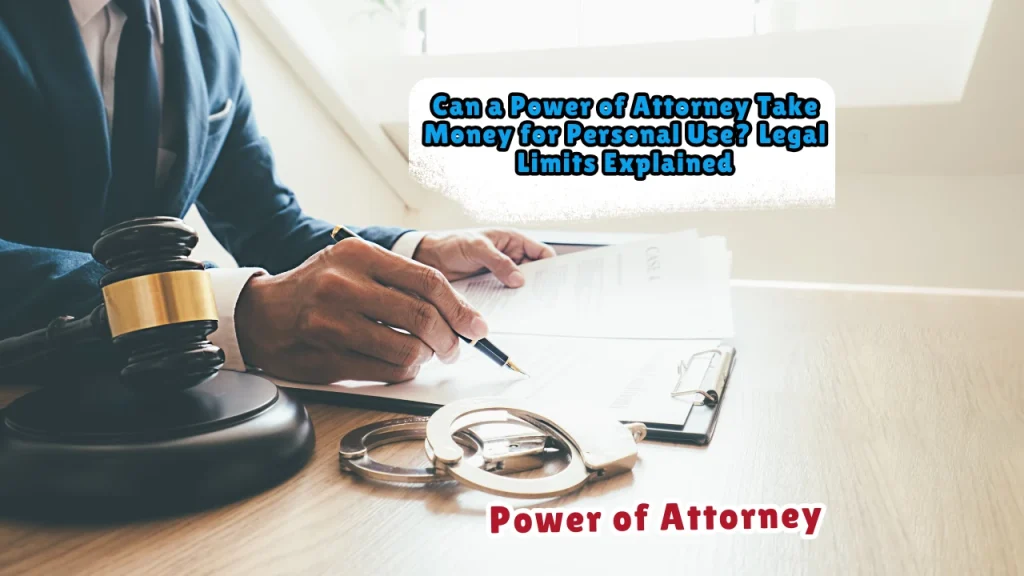Can a Power of Attorney Take Money for Personal Use? Legal Limits Explained
No. A Power of Attorney (POA) agent cannot legally use someone else’s money for personal expenses unless the POA document explicitly allows it. Misusing funds violates fiduciary duty and can lead to lawsuits, criminal charges, or fines.
Table of Contents
What the Law Says About POA Authority
A POA grants an agent legal authority to manage another person’s finances, property, or healthcare. However, U.S. law requires agents to act strictly in the principal’s best interests. Key rules include:
- No self-enrichment: Agents cannot pay themselves, transfer assets, or make personal purchases with the principal’s money unless the POA document clearly permits it.
- Mandatory transparency: Agents must keep receipts, bank statements, and records of every transaction.
For example, if an agent is authorized to pay the principal’s utility bills, they can’t use the same account to buy themselves a new phone. Even small, unauthorized expenses could result in legal action.
When Can an Agent Legally Access Funds?
Agents are only allowed to use the principal’s money for:
- Necessary expenses, such as medical bills, housing costs, or debt payments.
- Gifts or donations if the POA document includes specific instructions. Some POAs allow annual gifts up to the IRS tax-free limit ($17,000 per recipient in 2023).
Example of Permitted Use:
A POA might state: “My agent may gift up to $10,000 annually to family members for tax planning purposes.” Without this wording, gifting is illegal.
Real-Life Consequences of POA Abuse
In 2022, a California woman was ordered to repay $250,000 after using her mother’s POA to invest in her failing bakery business. The court ruled this violated California’s Probate Code §4231.5, which prohibits agents from using their role for personal profit. The agent claimed the money was a “loan,” but judges dismissed this argument due to a lack of documentation .
Potential Penalties for Misuse:
- Repayment: Courts can force agents to return stolen money, plus interest or damages.
- Criminal charges: Financial exploitation can lead to felony theft or elder abuse charges.
- Loss of authority: A judge may revoke the POA and appoint a court-supervised guardian.
Signs a POA Agent Might Be Stealing Money
Watch for these red flags:
- Large withdrawals from accounts with no clear purpose.
- Unpaid bills or utilities (despite available funds).
- Sudden changes to wills, trusts, or property titles.
- The agent avoids sharing financial statements or receipts.
Expert Insight:
“Agents often rationalize misuse as ‘borrowing’ or ‘helping the family,’ but unless the POA explicitly authorizes it, they’re breaking the law. Documentation is critical.”
— Sarah Johnson, Estate Planning Attorney, cited in The American Lawyer (2023).
Related article for you:
Does Divorce Automatically Revoke a Power of Attorney?

How to Prevent POA Exploitation
- Pick a trustworthy agent: Choose someone responsible with a stable financial history.
- Use a limited POA: Restrict the agent’s powers (e.g., “manage Bank of America account only”).
- Require accountability: Add a clause requiring the agent to share monthly reports with a lawyer or family member.
- Update your POA regularly: Review it every few years or after major life changes (e.g., divorce).
Government Resources for Help:
- The Consumer Financial Protection Bureau (CFPB) offers free POA abuse prevention guides.
- State-specific POA forms and rules are available on websites like Texas Law Help (texaslawhelp.org) or Florida Courts (flcourts.gov).
What Victims Can Do
- Revoke the POA: If the principal is mentally sound, they can cancel the POA with a written notice.
- Report the agent: Contact Adult Protective Services or local police to file a complaint.
- Sue for recovery: A civil lawsuit can force the agent to repay stolen funds.
Final Summary
- POA agents cannot use the principal’s money for personal gain without written permission.
- Abuse risks jail time, fines, and permanent loss of financial rights.
- Protect yourself by choosing a reliable agent, setting clear limits, and requiring oversight.
For more information, visit the American Bar Association’s guide to POA responsibilities or consult an elder law attorney.
About the Author

Sarah Klein, JD, is an experienced estate planning attorney who has helped clients with wills, trusts, powers of attorney, and probate matters. At All About Lawyer, she simplifies complex estate laws so families can protect their assets, plan ahead, and avoid legal headaches during life’s most sensitive moments.
Read more about Sarah
